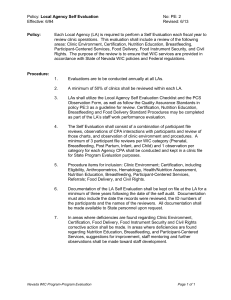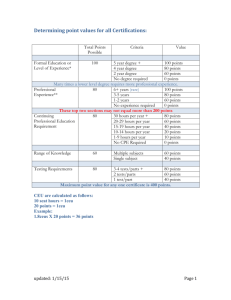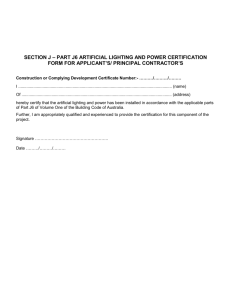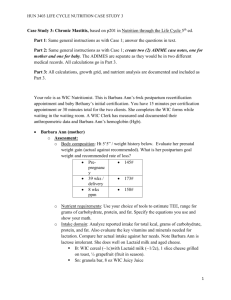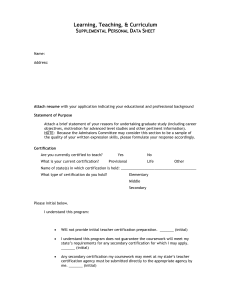Infants - Nevada WIC
advertisement
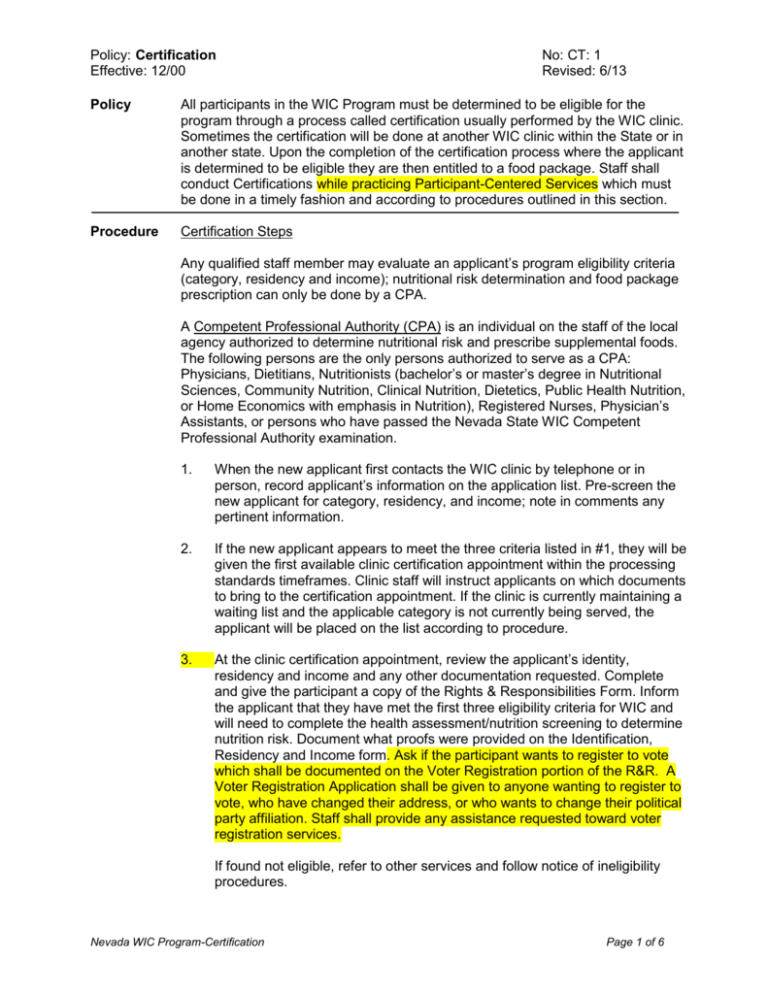
Policy: Certification Effective: 12/00 No: CT: 1 Revised: 6/13 Policy All participants in the WIC Program must be determined to be eligible for the program through a process called certification usually performed by the WIC clinic. Sometimes the certification will be done at another WIC clinic within the State or in another state. Upon the completion of the certification process where the applicant is determined to be eligible they are then entitled to a food package. Staff shall conduct Certifications while practicing Participant-Centered Services which must be done in a timely fashion and according to procedures outlined in this section. Procedure Certification Steps Any qualified staff member may evaluate an applicant’s program eligibility criteria (category, residency and income); nutritional risk determination and food package prescription can only be done by a CPA. A Competent Professional Authority (CPA) is an individual on the staff of the local agency authorized to determine nutritional risk and prescribe supplemental foods. The following persons are the only persons authorized to serve as a CPA: Physicians, Dietitians, Nutritionists (bachelor’s or master’s degree in Nutritional Sciences, Community Nutrition, Clinical Nutrition, Dietetics, Public Health Nutrition, or Home Economics with emphasis in Nutrition), Registered Nurses, Physician’s Assistants, or persons who have passed the Nevada State WIC Competent Professional Authority examination. 1. When the new applicant first contacts the WIC clinic by telephone or in person, record applicant’s information on the application list. Pre-screen the new applicant for category, residency, and income; note in comments any pertinent information. 2. If the new applicant appears to meet the three criteria listed in #1, they will be given the first available clinic certification appointment within the processing standards timeframes. Clinic staff will instruct applicants on which documents to bring to the certification appointment. If the clinic is currently maintaining a waiting list and the applicable category is not currently being served, the applicant will be placed on the list according to procedure. 3. At the clinic certification appointment, review the applicant’s identity, residency and income and any other documentation requested. Complete and give the participant a copy of the Rights & Responsibilities Form. Inform the applicant that they have met the first three eligibility criteria for WIC and will need to complete the health assessment/nutrition screening to determine nutrition risk. Document what proofs were provided on the Identification, Residency and Income form. Ask if the participant wants to register to vote which shall be documented on the Voter Registration portion of the R&R. A Voter Registration Application shall be given to anyone wanting to register to vote, who have changed their address, or who wants to change their political party affiliation. Staff shall provide any assistance requested toward voter registration services. If found not eligible, refer to other services and follow notice of ineligibility procedures. Nevada WIC Program-Certification Page 1 of 6 Policy: Certification No: CT: 1 Effective: 12/00 Revised: 6/13 4. CPA Only: Perform a Value Enhanced Nutrition Assessment (VENA) to determine nutritional risk and gather missing information through use of motivational interviewing techniques. The full nutrition assessment must be completed before nutrition education is provided. Determine the appropriate nutrition and/or medical risk; assign nutrition risk codes and priority. Inform participant of the length of their certification, options for the next nutrition contact and when they will have to recertify. Provide (1) nutrition education based on the participants needs and interests and followup on previously set goals as well as help participants identify new areas for goal setting, 3) referrals, and (3) supplemental foods. The CPA will not issue the food instruments to the participant they have just certified, unless clinic is staffed by just one person. 5. Inform participant of their Rights and Responsibilities and when their certification ends. Issue and explain food benefits and give the participant an appointment to return to the clinic for their nutrition education contact or high risk appointment. Eligibility Criteria To be certified, an applicant must meet four criteria: Category: Be a pregnant, breastfeeding, postpartum woman, infant, child under the age of five, and breastfed infants of participant breastfeeding women. Residency: Be a Nevada resident. Be under 185% of poverty or adjunctively eligible. (See CT:5) Income: Nutritional Risk: Have a risk identified through a medical/nutritional screening. (See CT:7) Certification Periods Certification periods terminate on the last day of the month for all categories with the exception of pregnant women. Pregnant Women The duration of the woman’s pregnancy plus up to six weeks postpartum. Presumptive Eligibility for Pregnant Applicants OnlyStaff may certify a pregnant woman for the program without doing a nutritional risk assessment if she has been determined categorical, residency and income eligible. The risk assessment is required to be completed within 60 days (30 day extension does not apply) after the presumptive certification. The woman will be removed from the program if no nutritional risk is found after this date. Assign risk code 503 and Priority IV. Once a complete certification has been performed, remove code 503. Postpartum Women Nevada WIC Program-Certification Page 2 of 6 Policy: Certification No: CT: 1 Effective: 12/00 Revised: 6/13 Non-Breastfeeding Up to 6 months after the delivery or termination of the pregnancy. Breastfeeding Up to the infant’s first birthday. If breastfeeding woman quits breastfeeding after 6 months from delivery date, remove from program without benefits. Provide client with a Notice of Ineligibility Form and graduation education. Children Children are certified every 12 months, ending with the last day of the month of their 5th birthday. Child Health Assessment- CHA All children certified for longer than a 6 month period are required to have a Child Health Assessment. This Health Assessment is a health screening and nutrition education contact which occurs approximately in the middle of the child’s certification period. The Child Assessment is an expanded nutrition education appointment; staff is not required to re-determine residency or income eligibility. Retain all original risk codes and assign new ones as determined (an exception to this is removing risk 401 if other risks are found). Staff is required to provide relevant nutrition education, guidance on feeding, physical activity and encourage ongoing healthcare. Children are required to have four contacts during the 1-year certification this is inclusive of the certification and CHA. A child Health Assessment (CHA) shall include the following: 1. Obtain weight and height or length measurements to assess growth. 2. Determine if an iron test is required based on the child’s previous iron test results and whether they were within normal test limits. 3. Follow-up on any goals the participant set at the previous appointment and any previous concerns or nutrition risks identified. 4. All children under the age of two will be screened for immunization status. 5. Ask open-ended questions to follow-up on health and nutrition status. Complete the CHA Form by asking/using the following questions/statements to generate conversation. a.) Tell me about how your child is eating. b.) Tell me about what types of activities is your child doing. c.) If there was one thing you could change about your child’s eating/activity what would it be? d.) What Questions or concerns do you have? 6. Offer education and referrals based on the participants’ needs, desires and concerns. Work with the participant on “next steps” to facilitate behavior change. Nevada WIC Program-Certification Page 3 of 6 Policy: Certification Effective: 12/00 No: CT: 1 Revised: 6/13 7. Assess previously prescribed food package for any needed or participant preferred changes. Infants Infants are certified up to 1 year of age or for 6 months, whichever is longer. If infant is a new certification and the medical evaluation date is before 6 months of age, the recertification date is the month of the infant’s first birthday, (e.g., Susan is certified at 4 months of age, her recertification period is 8 months. She is recertified at 12 months of age.) If infant is a new certification and the medical evaluation date is after 6 months of age, add 6 months to this date for the next recertification date, (e.g., Ryan is certified at 7 months of age, his recertification is at 13 months of age.) Infant Health Assessment-IHA All infants certified for a period of 9 months or longer are required to have an Infant Health Assessment performed prior to the end of their current certification. This Health Assessment is a health screening and nutrition education contact which occurs approximately in the middle of the infant’s first year. The Infant Assessment is an expanded nutrition education appointment, not a certification or eligibility determination. Staff is not required to re-determine residency or income eligibility at the Infant Assessment. Staff is required to provide relevant nutrition education, guidance on complementary feeding, and encourage ongoing healthcare. Retain all original risk codes (except for breastfeeding codes if no longer breastfed) and assign new ones as determined. A hemoglobin screening will be performed between 9 and 12 months of the participant’s age. Infants who are initially enrolled in WIC at less than five months of age shall be scheduled for an Infant Health Assessment between five and eight months of age. An Infant Health Assessment (IHA) shall include the following: 1. Obtain weight and height or length measurements to assess growth. 2. Determine if an iron test is required if the infant is between 9 and 12 months old. 3. Follow-up on any goals the participant set at the previous appointment, any previous concerns or nutrition risks identified as well as immunization status. 4. Ask open-ended questions Related to the Infant Health/Nutrition Questionnaire to follow-up on health and nutrition status. 5. Offer education and referrals based on the participants’ needs, desires and concerns. Work with the participant on “next steps” to facilitate behavior change. Nevada WIC Program-Certification Page 4 of 6 Policy: Certification Effective: 12/00 No: CT: 1 Revised: 6/13 6. Assess previously prescribed food package for any needed or participant preferred changes. Recommended infant appointment schedules for the first year are as follows: nd Age at Initial Certification Birth – 2 months Age for 2 Age at NE IHA Contact 3 – 4 6 months months Age for Additional 2 NE nd Age at Recertification & Hgb/Hct* Test 8 – 9 months 12 months 6 months 7 months 9 – 10 months 12 months 10 months 12 months None N/A 12 months 3 months None 4 months None 5 – 7 months 8 – months 8 months Approx. mid-cert None N/A Schedule Hgb/Hct check between 9 – 12 months 9 – 12 months Approx. mid-cert None N/A At certification 9 *Hgb/Hct test cannot be done before 9 months of age 30 Day Extension A grace period of plus or minus 30 days is allowed for certification periods for breastfeeding women, infants or children (other than those resulting in categorical ineligibility e.g. a child who turns 5 years of age). An extension is not allowed for pregnant women or non-breastfeeding women. This option should be utilized for client convenience (illness, synchronize family appointments, etc.) The certification grace period cannot exceed 30 days. After this the client must be re-certified before food instruments can be issued. Insufficient Information/30 Day Presumptive Eligibility If a participant is certified for a 30-day period due to inadequate documentation provided as defined in CT: 5 and fails to return within the 30-day period, the certification period expires. If that same person returns after the 30 day period, a new certification process must be conducted as outlined below. The certification cannot be back-dated to the first date the participant presented themselves at the clinic. Participants who provide documents within the 30 days Use same R&R to document income, initial and date and provide remaining months of benefits due. Participants who provide documents after 30 days but before 60 days A new R&R Form will need to be completed Participants who provide documents after 60 days A new R&R Form will need to be completed Nevada WIC Program-Certification Page 5 of 6 Policy: Certification Effective: 12/00 A new questionnaire will need to be completed A new height and weight will need to be obtained No: CT: 1 Revised: 6/13 Participants who provide documents after 90 days A new R&R Form will need to be completed A new questionnaire will need to be completed A new height and weight will need to be obtained A new hemoglobin will need to be obtained Regression A participant who has previously been certified eligible for the WIC program may be considered to be at nutritional risk in the next certification period if the CPA determines there is a possibility of regression in nutritional status without supplemental foods. Risk codes that are allowable to be use for regression are listed in Policy CT: 8 with a “R”. Participants certified for regression remain in the same priority in which they were previously assigned. A participant is only allowed to be regressed once following a certification in which a nutritional risk was identified. Institutional Residence Participants Participants residing in an institution (i.e. homeless shelter, shelter for victims of domestic violence, home for unmarried mothers, penal institution), are eligible for program benefits, if the following conditions are met: The institution may not accrue financial or in-kind benefit from the resident’s participation in WIC. Food items purchased with WIC F.I.’s are to be used by the participant only. Institutional proxies may not, as a standard procedure, pick up WIC F.I.’s for all program participants or transact the F.I.’s in bulk. (Refer to Policy FD:9, Issuance of Food Instruments to Alternate/Proxy and Cashing of Food Instruments by Authorized Alternate/Proxy, for assignment of an individual proxy) No institutional constraints may be placed on the ability of the WIC participant to partake of supplemental foods and all associated WIC services made available to the participants by the WIC local agency. Local agencies are required annually to contact institutional residences in their service area where WIC participants reside to assess compliancy with regulations. If the institution where a participant is staying is found to be non-compliant, staff will follow the procedure below: During the initial certification, the participant will continue to receive all WIC benefits. If the participant re-applies for WIC services and is still residing at the institution, staff will not issue the participant F.I.’s, with the exception of formula. The participant will continue to receive WIC education and referrals. Nevada WIC Program-Certification Page 6 of 6
